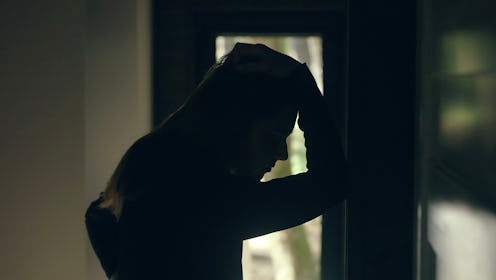
Like so many women, I suffer from anxiety. I'll admit it feels a bit melodramatic to me to say "suffer from," but as anxiety-havers know, it is a stone cold motherf*cker to cope with the cycles of irrational fear, perpetual perseveration, and waves of nausea on a regular basis. Given my intimate knowledge of the subject, I was not surprised to hear that women have more anxiety than men do — at least according to a new study by the University of Cambridge, which analyzed 48 previous studies and found that women are almost twice as likely as men to have experienced anxiety.
Although living in the world as a human being is enough to make anyone anxious, the unique issues that women face make it impossible for the majority of us not to worry. True, anxiety comes in all shapes and sizes and is often about brain chemistry, but it can also be situationally triggered — so anything from cat calling to everyday sexism to being socialized as "the second sex" might play a role in creating or exacerbating our anxiety.
For me, my gender identity and female body have always played a part in my anxiety, so I see the links loud and clear. I was first diagnosed with Social Anxiety Disorder (called SAD for short, oh the irony) and OCD at age 17 after missing so much school I risked failing out because I was afraid to interact with my classmates or even have them look at me. I had just switched from an all girls school to a co-ed one, and it really messed with my head. Sure, there were kids who might have glanced over at my hot pink and black mullet, but really, everyone was probably too wrapped up in their silly high school selves to actually be scrutinizing me in the way my anxiety made me believe they were. And that was just one issue of many I had to work on with a therapist — issues I sadly know that I share with a large portion of the female population.
Anxiety disorders aren't going away anytime soon, and we need to talk about them. Here are five facts about women and anxiety to know:
1. Women Are Twice As Likely To Be Affected By Anxiety
How is this even fair, I mean, COME ON. I didn't need a study to tell me that women are almost twice as likely to experience anxiety as men, but it makes so much sense for so many reasons. The bonus (if there is one) is that at least this means it's easy to find solidarity amongst lady friends. Nothing like a night out with the girls to share your worst-case fears, amirite?
2. Those Under 35 Are More Likely To Be Affected By Anxiety
Although both men and women under 35 are more likely to be affected by an anxiety disorder, the anxiety crisis in young women is well documented, and yet not adequately discussed. There is so much the general public needs to learn about what folks with anxiety face, and how these issues can be addressed.
3. Women Often Aren't Diagnosed Properly
Research has shown that it often takes, on average, between 9 and 12 years for a woman to be properly diagnosed with an anxiety disorder, and even then, many aren't adequately treated. Part of the reason it takes so long for women to get a proper diagnosis is the perpetuation of ideas in our culture that women are naturally "crazy" or "psycho" — which is some sexist bullsh*t.
4. Americans Are The Most Affected By Anxiety
Another not-so-shocking statistic: Americans are the most anxious folks in the world, with eight out of every one hundred affected. And if there are twice as many women as men dealing with anxiety, then a majority of those impacted are going to be some stressed, freaked out, panicked-as-hell women. Current stats show 23 percent of American women dealing with anxiety disorder today, whereas only 14 percent of men do.
5. Help Is Available
For me, coping with my anxiety has meant therapy and medication, though I've also gone years without either. I've tried to manage it with diet and exercise, which can help, but obviously does not cure it. Everyone's anxiety is a different shade of awful, but there is usually a way to alleviate some, if not all, of your suffering. If you have questions, the Anxiety and Depression Association of America has answers.
Images: Getty Images (3); Giphy (3)